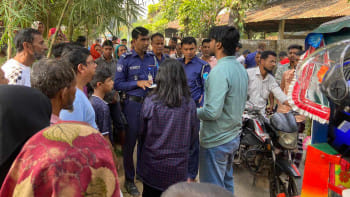Boutiques in a bind

Boutique operators in eight northern districts are worried about their survival as they now fear counting huge losses for the second year in a row due to the ongoing pandemic.
As a result, many of these boutique owners, who are mostly women, could quit the business as they predict poor sales ahead of the year's two most lucrative selling periods -- Pahela Baishakh and Eid-ul-Fitr -- due to all the social restrictions in place to curb the spread of Covid-19.
Besides, around 10,000 female artisans, who hand-stitch clothes for these boutiques, will also be in trouble if sales are poor ahead the two festivals.
During a visit to the Thakurgaon and Panchagarh districts, this correspondent found that there were just a few shoppers at local boutiques.
To offset the poor turnout of customers, some of the entrepreneurs tried their hand at e-commerce.
However, there too the response from buyers was inadequate.
While speaking to The Daily Star, several boutique owners said they are yet to see the required levels of customer turnout ahead of Pahela Baishakh due to the resurgence of Covid-19 cases across the country.
"We made about 500 pieces of Baishakhi and Eid dresses, including saris, salwar-kamiz, fatuas and baby clothes, at a cost of around Tk 4.5 lakh," said Chondona Ghosh, owner of the Karupanya Boutique.
Boutiques make most of their annual income just from these two festivals.
"But the situation is similar to that of last year when we missed two major selling periods amid a countrywide lockdown," said Chondona, also Thakurgaon's district representative of the Bangladesh Women Chamber of Commerce and Industry.
In hopes of recovering last year's deficit, she invested a total of Tk 4.5 lakh, of which Tk 2 lakh was financed by a government incentive package.
"But unfortunately, we are going to meet the same fate this year," she added.
Chondona said she previously got orders from wholesale markets in Dhaka worth about Tk 3 to Tk 4 lakh ahead of the two festivals.
This time though, she only got orders worth only about Tk 54,000.
Other than wholesale orders, these boutiques also set up shop at different fairs in Dhaka year-round to bolster sales.
Since the main customers of boutique houses—lower middle-income families—are sheltering at home in fear of being infected with Covid-19, sales have dropped drastically, she added.
Mokseda Begum, owner of the Ananya Hasta Shilpa boutique in Munshirhat, said she made a range of clothes worth over Tk 3 lakh, of which one third was invested in Pahela Baishakh dresses.
However, almost all her products remain unsold as the government imposed strict restrictions on public gatherings, such as celebrations and fairs.
To survive the initial pandemic-induced economic downturn, she borrowed money from various local sources to keep the business afloat.
But despite her efforts, the situation is once again turning bleak. Begum went on to say that several boutique owners have the same concern.
Similarly, the artisans who hand-stitch the clothes are concerned for their wages and also fear job loss if the situation prolongs.
Bilkis Begum, an artisan of Gilabari village in Thakurgaon Sadar upazila who makes clothes for Karupanya, said the owners of boutique houses usually pay for a major portion of their outsourced products after selling them.
"If they count losses, we have to face problems in two ways -- one for getting wages for work which they delivered already and second for receiving new orders," she added.
Around 400-500 female entrepreneurs, who sell clothing and accessories in the eight northern districts of Rangpur division, are concerned about how to sustain their operations.
Meanwhile, around 10,000 artisans -- mostly women -- are going to suffer for a lack of work orders, said Fatema Yasmin Era, Rangpur divisional president of the Bangladesh Women Chamber of Commerce and Industry.
The government should bring these entrepreneurs and artisans under the coverage of special incentives so that the industry can survive, she added.
In reply to a question about these incentives, Era said few entrepreneurs in Rangpur division had been brought under the stimulus package due to a lack of cooperation by the authorities concerned.
Nurel Haque, deputy director of the Bangladesh Small and Cottage Industries Corporation (BSCIC) office in Thakurgaon, said stimulus funds are disbursed by commercial banks, making it difficult for the small entrepreneurs to fulfil the conditions to avail loans.
This is because most small-scale entrepreneurs cannot submit the required documentation to secure loans from a stimulus package, said Haque, also member secretary of the district's Small and Medium Enterprise Loan Monitoring Committee.
Haque said Tk 80 lakh had initially been sanctioned for Thakurgaon's small entrepreneurs, who can avail a maximum of Tk 5 lakh each depending on his or her trading scale.


 For all latest news, follow The Daily Star's Google News channel.
For all latest news, follow The Daily Star's Google News channel. 



Comments